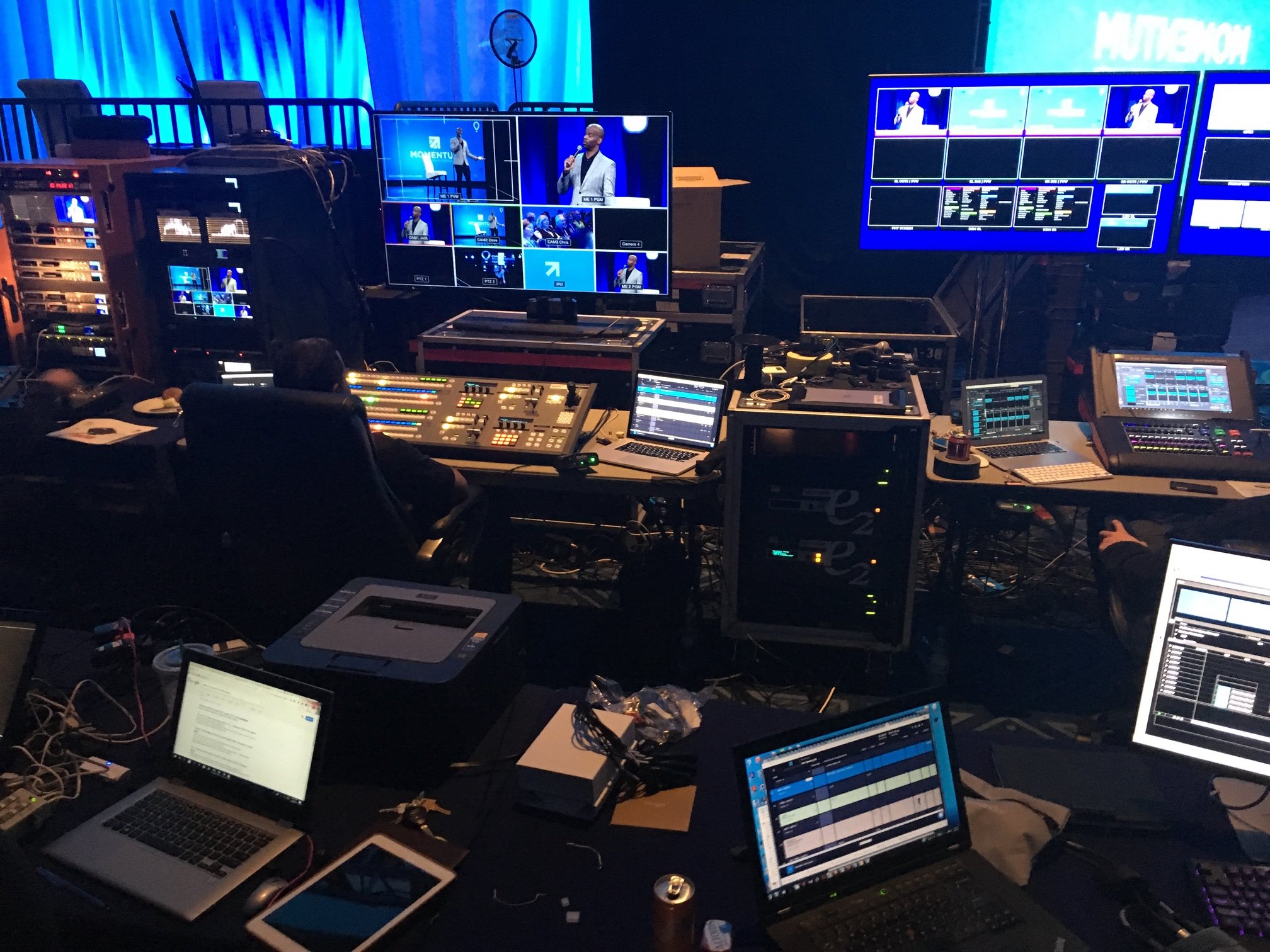How Event Production Works: A Comprehensive Look at the Process
Event production is a facility and structured procedure that requires careful preparation and implementation. It starts with establishing clear objectives and understanding the target audience. Each action, from budgeting to location selection, plays an important function in making sure success. As the process unfolds, numerous aspects need to line up effortlessly. The nuances of this intricate procedure often go undetected. What are the crucial stages that add to an unforgettable event?

The Initial Planning Phase
When beginning on event production, careful planning is important to ensure a successful result. The preliminary drawing board acts as the foundation for all subsequent efforts. During this stage, event manufacturers must specify the event's objective and goals plainly. Determining the target audience assists tailor the experience and messaging, assuring relevance and engagement.Producers should also think about the event style, whether it be in-person, online, or hybrid, as this will influence numerous logistical components. Picking an ideal day and place is crucial, as it impacts accessibility and availability.Furthermore, assembling a dependable team is basic for separating obligations and streamlining interaction. Developing a timeline with turning points guarantees all jobs are finished on routine. This stage entails extensive research study, including recognizing prospective difficulties and devising approaches to alleviate risks. Inevitably, a well-structured initial preparation phase establishes the tone for an effective event production journey.

Budgeting and Source Allocation
In event production, reliable budgeting and source allotment are essential for success - event production charlotte. Developing monetary parameters establishes the foundation for all subsequent choices, while source distribution techniques assure that every component of the event is sufficiently supported. With each other, these elements assist keep control over expenditures and enhance the use of offered sources
Establishing Financial Parameters
Establishing economic parameters is essential to the success of any event production, as it establishes the structure for effective budgeting and resource allotment. This procedure starts with defining the general spending plan, which encompasses all elements of the event, consisting of place costs, food catering, and marketing. By determining offered funds, event organizers can prioritize expenditures and assign sources as necessary. Furthermore, it is important to carry out thorough market research to expect prospective prices and recognize financing resources, such as sponsorships or ticket sales. Developing clear financial parameters also aids in danger administration, enabling coordinators to establish apart backup funds for unforeseen costs. Inevitably, a distinct spending plan offers as a roadmap, guiding the event production group in the direction of achieving their objectives while keeping economic control.
Source Circulation Strategies
Reliable source circulation methods are crucial for taking full advantage of the effect of an event while adhering to budget constraints. Successful event production calls for a thorough technique to budgeting and source allotment. Planners should prioritize important elements such as place, wedding catering, and modern technology, making sure that funds are assigned to areas that boost guest experience. A comprehensive budget plan should lay out anticipated expenses and recognize locations for potential price savings, such as bargaining with vendors or exploring sponsorship possibilities. In addition, tracking expenses throughout the preparation procedure assists avoid overspending. By using calculated resource circulation, event producers can supply a memorable experience while keeping fiscal duty, eventually contributing to the general success of the event.
Venue Choice and Logistics
Choosing the ideal venue is necessary to the success of any event, as it establishes the stage for the general experience. Place selection entails evaluating different variables, including capability, availability, and location. Coordinators need to take into consideration the target audience and the nature of the event, making sure the place aligns with the event's goals.Logistics play a considerable function in this procedure, involving plans for seats, audiovisual tools, and catering services. A well-chosen location needs to help with smooth flow for participants and team, enhancing engagement.Additionally, evaluating prospective places for services like auto parking, toilets, and emergency departures is crucial for safety and security and convenience. The timeline for securing the location is likewise important, as preferred areas might book quickly - event production charlotte. Consequently, complete preparation and prompt implementation can eventually add to a smooth event experience, making location option and logistics basic parts of effective event production
Imaginative Principle Advancement
While the location sets the physical stage, creative concept growth forms the event's identity and narrative. This process starts with recognizing the event's function and target market, enabling event producers to formulate an engaging style that resonates with attendees. Brainstorming sessions often consist of varied perspectives, promoting ingenious concepts that align with the event's goals.Once a motif is developed, visual aspects such as color schemes, signs, and decor are designed to boost the general atmosphere. Narration techniques may additionally be incorporated to create an interesting trip for participants, assuring a memorable experience. In addition, factors to consider concerning enjoyment, activities, and interactive parts are aligned with the picked concept, enhancing the style throughout the event.Ultimately, reliable innovative principle advancement warranties that every element of the event functions cohesively, leaving a long lasting impact on guests and fulfilling the event's goals. This fundamental work lays the foundation for subsequent preparation and execution phases.
Collaborating With Vendors and Suppliers
Successful event production pivots on effective cooperation with vendors and suppliers. Choosing reputable Check This Out companions, discussing agreements efficiently, and making certain prompt shipments are crucial action in this procedure. Each of these elements contributes considerably to the total success and smooth implementation of an event.
Choosing Reliable Partners
Just how can event planners ensure a seamless production experience? Choosing trusted partners is important in accomplishing this objective. Event organizers must carry out complete study to identify vendors and providers with a tested performance history of quality. This consists of examining referrals, reviewing portfolios, and assessing customer feedback. Planners ought to prioritize partners who demonstrate professionalism and trust, prompt interaction, and a readiness to team up. Structure strong connections fosters count on and enables quick analytical during the event. Additionally, it is advantageous to choose local suppliers that comprehend the venue and local logistics. Inevitably, an effective event hinges on the synergy in between organizers and their partners, guaranteeing that every aspect of production runs efficiently and efficiently.
Negotiating Agreements Successfully
Efficient negotiation of agreements is a crucial action in the collaboration in between event coordinators and their vendors and suppliers. This procedure involves clear interaction of assumptions, deliverables, and timelines. Planners need to carry out comprehensive study on market rates and industry criteria to develop a baseline for arrangements. It is very important to create a collective atmosphere, urging open dialogue concerning terms, pricing, and possible contingencies. Organizers should additionally prioritize recognizing the vendor's abilities and limitations to straighten their needs successfully. Flexibility can cause mutually useful agreements, promoting lasting relationships. Crafting distinct contracts that consist of details performance metrics can assist guarantee responsibility, inevitably leading to successful event implementation and fulfillment for all events involved.
Making Sure Prompt Deliveries
Prompt distributions are vital for the smooth implementation of any kind of event, requiring attentive collaboration between coordinators and their suppliers and suppliers. Effective communication is crucial, as it aids establish clear expectations regarding shipment routines, amounts, and details needs. Organizers frequently develop detailed timelines to outline vital turning points, making certain all events continue to be straightened throughout the procedure. Normal check-ins with suppliers can aid recognize possible delays early, enabling proactive solutions. Additionally, building solid partnerships with trusted suppliers cultivates count on and responsibility, which can cause better solution and prioritization. By prioritizing these collective efforts, planners can minimize disruptions, therefore boosting the general effectiveness of event production and guaranteeing that all necessary products and services arrive as intended.
Advertising and Promo Methods
While arranging an event, the success of advertising and promotion approaches can considerably influence presence and engagement. Efficient techniques often consist of a combination of electronic marketing, standard advertising, and grassroots outreach. Using social media systems permits real-time interaction and targeted advertising and marketing, reaching certain demographics effectively. Email advertising projects can even more involve potential guests with tailored content and reminders.Collaborations with influencers or market leaders can additionally enhance credibility and broaden reach. Developing engaging material, such as video clips or blog sites, assists browse this site to generate buzz and suffer passion leading up to the event. In addition, leveraging early-bird discounts and special rewards can incentivize ticket purchases.Promoting through conventional networks, such as posters or neighborhood media, continues to be appropriate, specifically in community-focused events. An extensive technique that incorporates numerous techniques assurances optimum presence and involvement, eventually adding to the event's success and the production of a remarkable experience for attendees.
On-Site Execution and Management
On-site execution and management are vital parts that establish the general success of an event. Efficient sychronisation during the event guarantees that all aspects line up with the prepared program. Event managers supervise logistics, including vendor sychronisation, devices configuration, and guest services. Keeping an eye on timelines and resolving any kind of unanticipated problems are essential for preserving a seamless experience.The staff plays a significant role, as trained personnel are liable for numerous jobs such as registration, information circulation, and technical support. Communication among staff member is necessary; it cultivates a collective atmosphere and enables quick resolution of challenges.Additionally, safety protocols have to be stuck to, protecting the well-being of all participants. Post-event examinations are also component of on-site administration, giving insights for future improvements. By concentrating on these Discover More elements, event manufacturers can produce memorable experiences that fulfill or exceed participant assumptions while attaining the event's objectives.
Regularly Asked Questions
Just how Do I Select the Right Event Motif?
Selecting the appropriate event style involves taking into consideration the target audience, event objective, and venue. Looking into current fads and gathering input from stakeholders can likewise motivate innovative concepts that resonate and produce a memorable experience.

What Are Typical Mistakes in Event Production?
Common blunders in event production often consist of insufficient planning, poor interaction amongst employee, budget mismanagement, disregarding to take right into account the audience's needs, and falling short to perform a thorough post-event analysis for future improvements.
How Can I Gauge Event Success?
To determine event success, one can evaluate participant contentment, interaction levels, spending plan adherence, and post-event comments. Secret performance signs, such as ticket sales and social networks communications, likewise offer beneficial understandings into general effectiveness.
What Should I Do if It Drizzles on the Event Day?
In the event of moisten the day, the coordinator ought to implement backup strategies, such as protecting tents or relocating activities inside. Communication with participants about modifications is important to assure a smooth experience despite climate challenges.
Exactly How Can I Ensure Guest Involvement During the Event?

Comments on “How to evaluate your success using event production charlotte’s analytics tools”